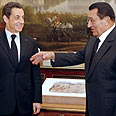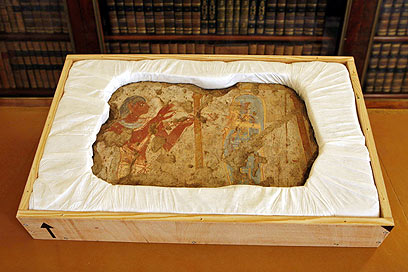
France returns stolen Louvre relics to Egypt
French President Sarkozy hands Hosni Mubarak stolen painted wall fragments from Luxor tomb, dating back 3000 years, ending row which prompted Cairo to break off relations with museum
French President Nicolas Sarkozy handed his Egyptian counterpart Hosni Mubarak a stolen ancient relic on Monday, ending a row between France and Egypt over artifacts taken from a Luxor tomb.
"Thank you very much," Mubarak said as Sarkozy presented the painted wall fragment to him, following a formal lunch at the Elysee presidential palace.
The small relic is one of five "steles" that were chipped off a wall painting in the ancient Egyptian tomb of Tetiky, dating back some 3,000 years to the Nile kingdom's 18th dynasty.
Louvre curators purchased the artifacts in 2000 and 2003 and kept them in storage at the museum.
Egypt demanded the return of the stolen fragments in October and broke off relations with the Louvre.
Afterwards, France agreed to hand back the works, which are from Luxor's Valley of the Kings.
"France is particularly committed to fighting the illegal trafficking of works of art," Sarkozy said, in a statement.
The other four artifacts were to be given to the Egyptian embassy in Paris during Mubarak's visit to Paris, French officials said.
The French president emphasized that the Louvre museum had acted in good faith when it purchased the artifacts and said that doubts were only raised in November during archaeological work at the site.
Egypt had produced photographs from the mid-1970s showing the fragments in place on the tomb's wall.
A 1972 UNESCO convention states that artifacts are the property of their country of origin and pieces smuggled out of a country must be returned.
Cairo's antiquities department, which controls access to all of Egypt's archaeological sites, had broken off ties with the Louvre and said they would be restored once the relics were returned.
Egypt is stepping up demands for the restitution of many relics including the Rosetta Stone on display in the British Museum and the bust of Queen Nefertiti in Berlin's Neues museum.
"Everything which was stolen from us should be given back," said Zawi Hawass, the current head of Egypt's Supreme Council of Antiquities, in January.

The painted wall fragment handed to Mubarak (Photo: Reuters)
Museum curators purchased four of the five fragments in 2000 from the collection of French archaeologist Gaston Maspero and a fifth piece was bought in 2003 during a public sale at the Drouot auction house.
But Hawass had said that he believed the Paris museum bought the antiquities even though its curators knew they were stolen.
"The purchase of stolen steles is a sign that some museums are prepared to encourage the destruction and theft of Egyptian antiquities," he said.
Egypt had put on hold a series of conferences organized with the museum and suspended work carried out by the Louvre on the Pharaonic necropolis of Saqqara, south of the capital Cairo.
Sarkozy said the restitution of the relics reflected the "quality of relations between the two countries and the excellent cooperation in the field of archaeology."
In 2007, France returned hairs from an ancient pharaoh that were nearly sold on the Internet by a French postal worker whose father had acquired them during the scientific examination of the royal mummy 30 years previously.
The case prompted Egyptian authorities to bar foreign scientists from examining royal mummies.










